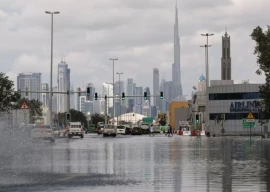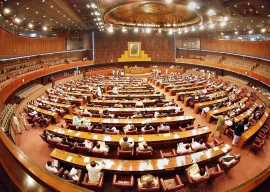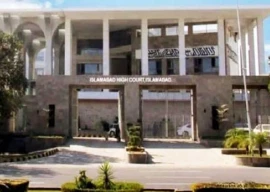
This isn’t about tallying up which industry will find a market in India and which one will not be able to compete. Of course, there will be winners and losers as the normalisation proceeds, but the process will be complex. The auto sector, for instance, is likely to see many losers. Pharma and fertiliser and value added textiles are likely to see many winners. Agriculture will find better quality seeds and pesticides and larger markets in India, but will see the price of urea fertiliser climb.
This isn’t about drawing up a list of items we have to sell to India. Let’s not take a shopkeeper’s view of such momentous changes. This is about ‘import substitution’ of an altogether different variety. For instance, where our pharmaceutical manufacturers have had to purchase equipment and raw material from Europe or America, they will now have access to one of the world’s leading pharmaceutical industries to tap into science, technology and human resource. India is the world’s largest importer of urea fertiliser and industry insiders say that with access to the Indian market, urea made from imported liquefied natural gas (LNG) becomes competitive for them. These same investors would be willing to set up an LNG import terminal, capable of bringing in up to 500 units of the vital fuel, of which 100 units can be consumed in their urea plant, and the balance sold to the state distributor, thereby helping to alleviate the shortages in the country.
The kinds of production possibilities that open up once you magnify the playing field are huge — in fact, they’re historic — and those with initiative and wherewithal will be able to capture the moment. Those wedded to the older, rentier ways will find it hard to adapt and inevitably resist the move. I say let them go. I’ll be glad to buy my next car from India, sold to me by a local distributor of course, rather than pay exorbitantly over here and then pay additional ‘own’ money or wait months for delivery, during which time they could arbitrarily hike the price again and make me pay the difference.
I for one am sick and tired of hearing from our textile industry about all their problems and difficulties. They’re always complaining as a reflex action, and I know that those complaining the loudest are usually the ones making the most amount of money. In spite of all their hype about gas shortages and what not, last year they raked in more money than ever before if the export figures are anything to go by. I really wonder why the record exports of last year do not show up in revenue numbers for corporate income taxes paid by our textile magnates. The same people who are very clever at evading taxes suddenly become very dumb at finding ways to adapt to changing realities. I say those who can’t adapt should be told to start winding up their businesses and take up golf instead.
Of course, there will be problems to work out along the way. Non-tariff barriers (NTB), for instance, are a reality. But everybody has NTB related complaints regarding India, not just Pakistan. Those NTBs that are Pakistan specific will disappear as normalisation proceeds but, more generally, NTBs are something we will be talking about for years and years to come, along with every other country that trades with India.
Who knows what will happen to our regime of administered pricing, we might be forced to start rolling it back since setting prices by committee may not be feasible in the new complex environment that will open up. Who knows what will happen to our tariff structures regarding the rest of the world. India assesses far smaller duty on tea than Pakistan, for instance, and freer trade could mean we either bring down our duties or divert our procurement to India instead.
The point is that a large transformation will be upon us, even if it’ll come slowly. An enormous rectification of the historic record, a return to a more natural and time tested economic reality where the territories that comprise Pakistan offloaded their output into large markets that fed all of North India, as well as mediating between the major economic regions of the world, the Middle East, China and India. Of course, much work remains to be done. The nitty-gritty of the job must begin now. But what needs to be borne in mind is that there is only one direction to go: forward. Staying bottled up behind walls and remaining stubbornly wedded to a primitive autarkic model of growth is no longer an option.
Published in The Express Tribune, November 10th, 2011.
COMMENTS (32)
Comments are moderated and generally will be posted if they are on-topic and not abusive.
For more information, please see our Comments FAQ














































@Khurram Dastageer
Please remove the "made in china" stickers...because here the army won't prefer much of chinese products because they all had bad experiences with them. Suppose the wing breaks off in mid air or the engine fails then...
@adnan bhai I really hope this happens. Public in both countries stand to benefit, but huge egos on both sides might still stop it from happening.
A Khan
All the more reason for normalising trade with India. Just imagine the huge market 'superior' Pakistani products are likely to have.
PS- Are the Chinese falling for the 'superior' products or they are still stuck with 'inferior' Indian products?
@Manmohan Singh
We are prepared to buy 100 JF-17 from Pakistan, as long as Pakistan agrees to remove the “Made in China” stickers from the aircraft.
Do they have the 'technology' for sticker removal? Or will the have to reactivate Dr AQ network to get it?
@narayana murthy
Yes we have a lot of things being manufactured. I can tell ur ignorance when u couldnt even spell my name right.
Havn't seen any Pakistani goods except mangoes and salt, but hope to see some more in the near future.
@Alam dhar
are there any products that are pakistani? i wud really like to know. cuz, i was under the impression that everything sold in pakistan are chinese.
@Meekal Ahmed: "I am not so sure about the Indian car. They have this frightfully ugly product whose name I forget".
You are perhaps referring to Nano. But there are many other foreign cars that are assembled in Pakistan but manufactured in India - so importing those could be cheaper e.g. Suzuki, Hyundai, Ford, GM
@A.Khan: "Please dont mind our Indian readers. As far as my experience goes, I found a big quality gap between the food items from Pak and Ind"
Well if Pakistani food products are better, then India will not be successful in exporting food products to Pakistan. What does that have to with granting or witholding MFN?.
@ET.. trade may not reduce tensions but it will certainly hinder the misadventures, like Kargil, from both the sides because they will have a lot to loose..
@Sandeep: i fully agree with u.in the end public of both countries will benefit
A very perceptive piece, Khurram. The sharp winds of competition is always good and hopefully will help put downward pressure on the exorbitant profits being earned by non-competitive and protected sectors of the economy to the ultimate benefit of the consumer.
I wish this had happened 20 years ago.
I am not so sure about the Indian car. They have this frightfully ugly product whose name I forget. Makes you wonder why small and fuel-efficient needs to be so hard on the eyes!
For those doomsday prophets who are whining about cheap Indian products undermining the local Pakistani industry, what about the really cheap trinkets and stuff being dumped into the Pakistani markets by Pakistan's BFF, China? Are they invigorating your local industry?
Trade trade, let us play... War War, go away. Peace...
@Khurram Dastageer:
Yes, I agree to your highly intelligent statement. Even the Americans should buy your JF whatever as India found US planes technically not at par with Eurofighter and ..... But I must say that you are very logical to suggest to buy China made Pakistan supplied fighters to bomb Nepal and Bhutan.
Trade normalizing tensions is a huge misconception. Russia and America have remained trade partners during the cold war era. Trade happens between Israel and its neighbors. Even North and South Korea trade to some extent. As long as ideologies are colliding, no amount of trade in the world can normalize tensions, irrespective of the economic boosters.
Afterall Pakistan does export and import from other countries which are far and away. The end consumer pays for the extra transportation cost incurred. Now why can't these two countries trade across the border? The consumer on both sides benefit from lessor transportation cost. Or is it somebigwigs own the cargo ships and planes?
Please dont mind our Indian readers. As far as my experience goes, I found a big quality gap between the food items from Pak and Ind. In Europe we try to stick to the Pakistani products because they are more hygienic. When we found a hair in Ras Gulla in seal pack, when we tasted dirt in a nimko from India, when we found plastic fibres in spice. Thats not what we eat in Pakistan and in Europe no way!
MFN to India will only cripple the Indian Economy. The Indians must realize that drugs and opium, which are the sole cause of a good university experience, would flow into Indian territories through black channels, in trucks and trains. No one is going to buy a Nano, the Author might not even fit into a Nano car, which was recently rated with the "Worlds Worst Interior", just google it and you'd realize it's just a failed Uni Engineering Project - it's a mess no heavy duty guy or chikita will ever buy, however some folks in Karachi might find it useful.
Given the current situationm this article should be rated as fiction or an utopia.
trade imbalance will shift from china and other exporters to india, thats simple its a win win situation, as far as the authors's reservations over tax paying textile owners and auto assemblers, they will obviously find ways to compete but not increase in tax base should be expected and auto assemblers have earned the full amount of their investment back, whatelse ...welcome free trade, welcome india, we share a common future with distinct boundries
Indian cars in Pakistan, Pak cement in India Pak fertilizer in India Pak onions in India (thanks guys I remember this from 2008!) Indian tomatoes in Pak Cheap Indian pharmas in Pak so aam janta can afford to be healthy.
THIS IS GOING TO BE GREAT!
Hope both sides don't screw this up though...
How do you plan to cover the trade imbalance?
@Khurram Dastageer LOL
You Paks have huge ego that is such a mismatch to Pakistan's actual status in reality- economic and otherwise. LOL!
jf17 itself is a joke,and asking India to pay for it is madness....
Author does have some valid points but his article shows his frustration with Pakistani businesses. It seems he is not aware that greed is universal!! . I am glad with MFN status. Lets hope we will work very hard to compete with Indian businesses, though our record suggestes otherwise.
We are prepared to buy 100 JF-17 from Pakistan, as long as Pakistan agrees to remove the "Made in China" stickers from the aircraft.
I agree with Khurran Dsatageer, the bottom line is, India needs to drop it's tender for 128 fourth generation Eurofighters, India must re-float the tender and Indian Foreign Ministry should influence the procurement committee to purchase at least a 100 JF-17 Fighter Jets, the most high value Pakistani product there is at the moment. Can you guarantee that Mr. Author, or would you like to discuss irrational NTB's here?
Normalising trade with India is great. Trade with any nation is great, but at what cost is Pakistan giving India MFN status. Indian products will become increasingly cheap and local Pakistani products will not be able to compete with them. In addition to that it is unwise to be dependent on India as you never know in the case of an unfortunate happening in India may be blamed on Pakistan and they may pull the plug on raw materials which will adversely affect Pakistan.
No trade with India until India buys our 100 Jf-17 fighters. Only then we will give MFN status. Enough of sweet talk, now its hard time to get to the BRASSTACKS.